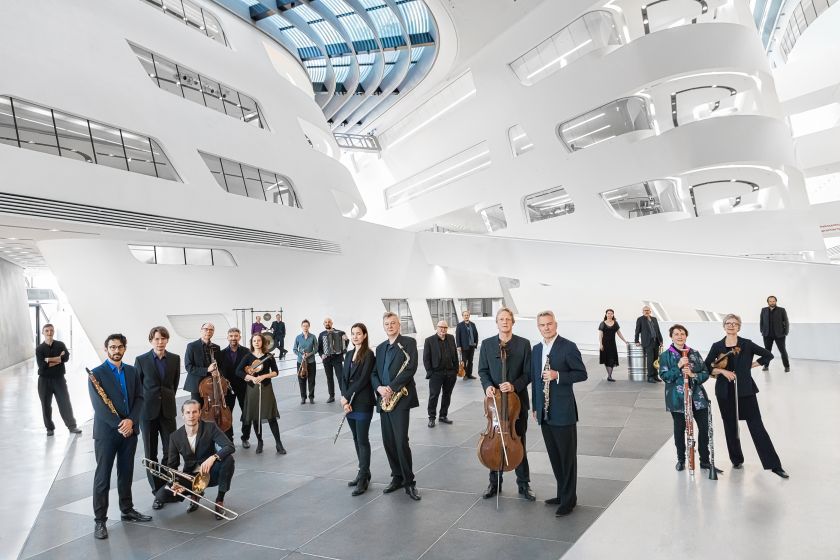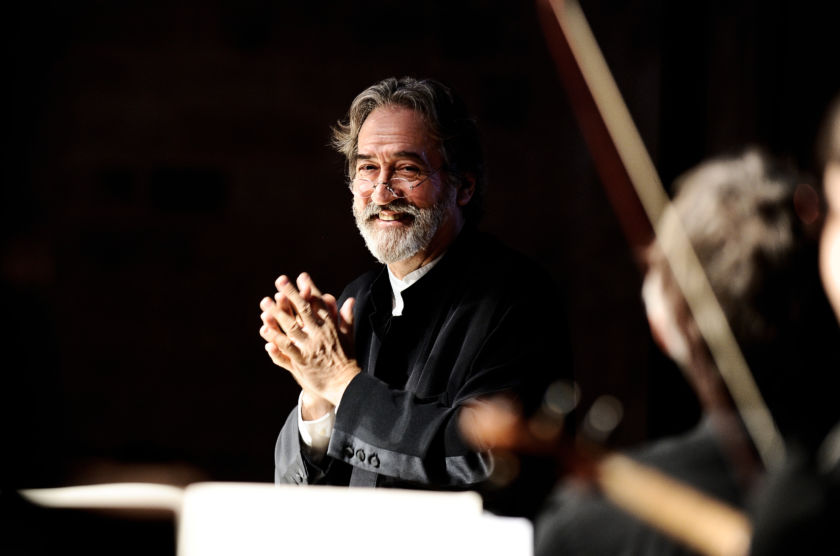Ouverture Spirituelle
Aquarell auf Büttenpapier, 36 x 22,5 cm
Courtesy Galerie Magnet, Völkermarkt, Foto: Foto Prokop
© Martha Jungwirth / Bildrecht, Wien 2023
Et exspecto – and I await

The 2024 Ouverture spirituelle revolves around hope that transcends death, but also focuses on the doubts and desperation often accompanying farewells and endings.
“It is the very abuse of power—political, financial, economic, cultural, fideistic, ideological, unidirectional, worse if disguised as cunning permissiveness—that triggers my deepest instincts of rebellion and against which I will never tire of fighting.” Thus, Luigi Nono described his solidarity and social activism in 1987, three years before his death. At that point, he did not believe – or no longer believed – that art itself would show a concrete, direct path to improving the world. But Salzburg Festival audiences have often had the opportunity to realize that Nono’s music has the power to make utopias imaginable, formulating optimism and hope for the long term. The 2024 Ouverture spirituelle is not entitled “Credo” – I believe – but “Et exspecto” – I await.
In 2024, the Italian composer Luigi Nono would have turned 100. Commemorating this occasion, the Festival is presenting one of his central works, Il canto sospeso. In this “suspended, discontinued, floating chant“, which has lost none of its topicality since its world premiere in 1956, Nono uses farewell letters by executed members of the antifascist resistance, setting them to music on the basis of serialism, but also with reminiscences of the spatial effects and polyphony of the renaissance period and the art of the Italian madrigal – in such a way that the perception of the words is largely “suspended”, removed from immediate understanding: a conscious alienation and abstraction. Taking the role of narrator, Tobias Moretti leads the cast of soloists. Maxime Pascal, who conducts the ORF Radio Symphony Orchestra Vienna and the Bavarian Radio Chorus, combines Nono with one of his immediate predecessors, as regards a concept of musical theatre that insisted on embodying a social and political attitude: Luigi Dallapiccola. His opera Il prigioniero is a one-act piece that is as dark as it is stringent. The manner in which Dallapiccola blends the past of the Spanish Inquisition with the massacres of World War II is fascinating. With Tanja Ariane Baumgartner, Georg Nigl and John Daszak, the cast boasts impressive singer-actors.
Beat Furrer’s Begehren is oriented towards the mythical. The Swiss-born composer was already the subject of a special Festival focus in 2018, the series “Time with Furrer”. In his musical theatre work, first performed in 2001, ancient texts dealing with the myth of Orpheus are combined with modern echoes. There is no story in the conventional sense; instead, waves of leave-taking, remembering and searching overtake one another; the sound palette makes use of every imaginable noise, even the sound of breathing. The coloratura soprano Sarah Aristidou, the versatile Christoph Brunner, Cantando Admont and the Klangforum Wien will be conducted by the composer himself.
The third great concert performance of an opera as part of the Ouverture spirituelle will be Koma (definitive version of 2019) by Georg Friedrich Haas, based on a libretto by Händl Klaus: Michaela is in a vegetative state. Was it an accident or possibly attempted suicide? She is present, yet incredibly far away, caught in a no-man’s-land – and surrounded by her family and their memories. Haas combines his suggestive music with an intrinsic darkness, which he also demands on stage for long passages: everything is perceived from Michaela’s perspective. The Klangforum Wien and Bas Wiegers, one of Haas’ preferred conductors, will guarantee an unforgettably impressive musical theatre experience.

The concert programme of the Overture makes waiting and expectancy audible, along with fear of the future and joyful anticipation, its prospect and appearances throughout the centuries. By necessity, faith in resurrection requires confrontation with death. The venerable entrance portal this year will be Johann Sebastian Bach’s St. Matthew Passion, one of the great monuments of western music history. Under the baton of Teodor Currentzis, the members of Utopia perform, with Julian Prégardien as Evangelist and Florian Boesch as Jesus. A contrasting counterpart for Bach’s St. Matthew Passion is George Frideric Handel’s grandiose oratorio Israel in Egypt. First performed in London in 1739, it describes the biblical events from Joseph’s death and the servitude of the Israelites in Egypt to Miriam’s song of triumph after crossing the Red Sea and the destruction of the Pharaoh’s army – a subject of shocking topicality. The chorus becomes the bearer of musical statements. It will be performed by the fabulous ensembles Monteverdi Choir and English Baroque Soloists under the baton of Peter Whelan, experts for Handel’s subtlety and his overwhelming pomp and splendour.
Additional bridges will be built between eras, styles and nuances of meaning, making the Ouverture spirituelle a fascinating place of encountering rarely-heard works: pieces by Antoine Brumel, Thomas Tallis, Alessandro Striggio, Marc-Antoine Charpentier, Michel-Richard Delalande meet compositions by György Kurtág, Sofia Gubaidulina, George Crumb, Arvo Pärt, Gérard Grisey, Claude Vivier, Georg Friedrich Haas, Pēteris Vasks and Jörg Widmann, and these combinations create unique musical experiences – interpreted by artists such as Lionel Meunier and Vox Luminis, The Tallis Scholars with Peter Phillips, Christoph Sietzen with Motus Percussion, the Camerata Salzburg, Klangforum Wien, Jordi Savall with La Capella Reial de Catalunya and Le Concert des Nations, the Minguet Quartet, Patricia Kopatchinskaja and many others. They make music of hope and desperation resound, they praise God in the Te Deum and lament to him from abysmal depths in De profundis, they weep for their dead: “Et exspecto” encompasses grief, consolation and expectation.
First published in the Festival insert of Salzburger Nachrichten 2024
Translation: Alexa Nieschlag
